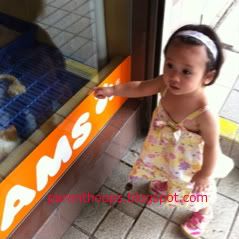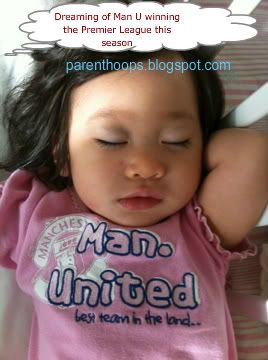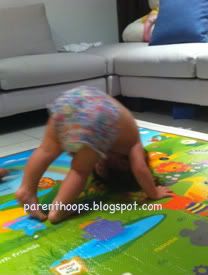Happy New Year! Gong Xi Fai Cai! 祝贺大家龙年龙马精神,万事大吉!
Chinese New Year has always been one of my favourite times of the year. This is our second year with Dear Daughter in tow. And I have to say - things do get better. I had a fabulous CNY.
1. For one, being with our parents and the huge extended family means I have two hands to myself. This is something which they don’t warn you of in parenting books. Have a baby and learn to do everything with one hand.
Chinese New Year has always been one of my favourite times of the year. This is our second year with Dear Daughter in tow. And I have to say - things do get better. I had a fabulous CNY.
1. For one, being with our parents and the huge extended family means I have two hands to myself. This is something which they don’t warn you of in parenting books. Have a baby and learn to do everything with one hand.
2. I am able to savour the endless rounds of good food in peace. No
gobbling an entire meal in two or three bites or chasing after a toddler in
between stuffing myself with mouthfuls of food.
3. DD runs around entertaining our family members. Her joy is
infectious and it is great to see others loosen up with her and laugh along.
This is the year she gets very interested in dogs. It cracked us up when she
stands at the door beckoning the family dogs to come over with, ‘Dog! Come here!’
Guess what she saw?
Aww, lovely puppies which are as excitable as she is. Too bad condos in KL can't keep dogs.
4. I taught DD to do the ‘gong xi’ pose, the one where you put both
fists together and shake vehemently as a symbol of congratulations. Children at
this age learn quickly through mimicking adults (yes, that’s why we are role
models). DD saw DH and I offering two mandarin oranges to our elders and copied
us by bringing mandarin oranges to her grandparents. It heartens me.
It is very important to me that DD is exposed to the Chinese
traditions. I want her to learn to greet her elders, to wait till the elders
eat before she can start. I want her to know not just Mandarin but also her dialects.
After living in Hong Kong for a couple of years and covering the
North Asia markets, I am convinced that knowing Mandarin is mandatory and
basic, knowing the dialects is the next wave of advantage.
I remember when I first started out doing sales, my boss who was
the Head of Sales told me that ‘D, clients don’t buy from you because you have
the best product or best price. People buy from people they like.’ It’s true,
and usually speaking the local language helps break the ice and brings people
closer. The benefits of knowing languages are intangible but very real.
Unfortunately for the younger generation, they are generally
exposed to English only and deprived of the opportunity to learn dialects. Here
in KL, it’s pretty bad. From primary level, we would be forced to choose
between going completely Chinese, completely Malay or pay through the nose at
an international school. At the all important early childhood stage, there is a
dearth of options.
Yes, many kindergartens claim to teach Mandarin. But you don’t
pick up a language unless you are immersed in it. Allow the child to interact
in the language so that his/her brain forms the right synapses. The system our
school uses alternates between English and Chinese weeks, allowing full
bilingual immersion and have successfully produced batches of effectively
bilingual children since 1998. This is why I went through the drastic measure
of importing a system.
Having said that the best way to learn a language is not through
a taught environment but rather in everyday life. For DD, I speak to her in
English, Mandarin and Cantonese. Occasionally we learn Japanese together (I
studied years of it but don’t remember most of it since I have not used the
language in years). When my parents are here, I ask them to speak to her in
Hokkien as well.
Initially my parents resist here fearing it would make them
‘uncool’. I had to laugh when I heard this. This coming from my strict
traditional dad. After I explained to them my rationale, my dad agreed that
imparting her with dialect skills is an invaluable gift.
He questioned then if it would be confusing for DD to be exposed
to so many languages at a tender age. I explained to him that when children are
under three, their ability to absorb information is tremendous. Just expose
them to the languages actively (ie. not passively through a DVD and hope for
the best) and the little seeds are planted in their brains. You will be
surprised how kids pick up the nuances of languages almost instinctively.
At the end of the day, the most important thing to me is that DD
is happy. I will provide her a nurturing environment to acquire knowledge and
skills in a fun way. A good foundation in early childhood serves as a
springboard to realizing her full potential. After this, it’s up to her how far
and high she wants to fly.








